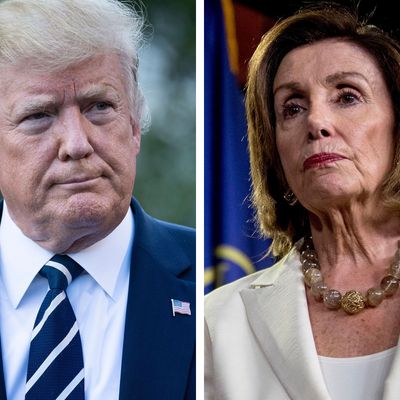
If you love partisan Kabuki theater, predictable debt-limit crises, actual government shutdowns, threatened government shutdowns, or hyperventilation about budget deficits and debt, this was a sad day for you:
Yes, more than two months before the end of the fiscal year, and weeks before the Treasury was due to begin sending up serious flares about running out of cash, and even a few days before the beginning of the August congressional recess, it appears the administration, with Stephen Mnuchin acting as chief negotiator, and Nancy Pelosi, representing the congressional chamber controlled by Democrats, signed off on a budget deal that had been reported as near completion. Politico explains the basics of the deal as it is currently understood:
Under the deal, the Pentagon’s budget would increase to $738 billion next fiscal year — a $22 billion increase that is just short of Trump’s demands but above House Democrats’ proposal, according to multiple sources.
It would also increase nondefense spending to $632 billion — a $27 billion increase that marks a victory for Democrats, though the money will also have to cover extra Census costs as well as a shortfall in Veterans Affairs funding….
The agreement would eliminate the threat of dual fiscal crises that have long been hanging over Washington — an unprecedented default on U.S. debt and massive across-the-board spending cuts that could paralyze key agencies.
The spending levels are a combination of an effort to accommodate both parties’ top priorities and a split-the-baby compromise on exact levels — at the expense of deficit and debt control. The deal will punt any further debt-limit problems to 2021, when the White House will either be under new management or we’ll all have much bigger problems. And it will also finally put a stake through the heart of the largely failed “sequester” procedure for automatic spending cuts put into place by an earlier bipartisan budget deal back in 2011.
There will be squawking over the deal both from conservatives who wanted more domestic budget cuts (and/or maintenance of the “sequester” for non-defense accounts) and progressives who think the domestic-spending levels are inadequate and/or that the bloated Pentagon budget could have gone on a diet. But it’s very much the kind of deal that has become customary in the era of divided government, enacted with a little less posturing than usual. It’s particularly significant that the administration was representing its party in the negotiations, which means we don’t have to wait around to see if Trump will blow it all up (unless, of course, he flip-flops to denounce the deal he just took credit for).
A hazier part of the deal pledged both parties to avoid “poison pills” —provisions the other party cannot accept — in the appropriations bills that will ultimately implement the agreement. This was mostly a Democratic concession to Trump, notes the Washington Post:
The deal … marks a significant retreat for the White House, which insisted just a few months ago that it would force Congress to cut spending in a range of programs as a way to enact fiscal discipline. Instead, the White House agreed to raise spending for most agencies, particularly at the Pentagon.
In exchange, White House officials received verbal assurances from Democrats that they would not seek to attach controversial policy changes on future spending bills, though it’s unclear how that commitment will be enforced.
Examples of Democratic “poison pills” supposedly off the table are efforts to repeal the Hyde Amendment, which bans federal Medicaid dollars for abortions, and efforts to stop border-wall construction.
Since neither party has the power to impose its priorities on the other, what each is essentially giving up is the ability to use a budget fight to mobilize public opinion and energize its base going into 2020. That’s important to understand when you hear members of Congress and opinion leaders from both sides wail and gnash their teeth over the deal and threaten to drag Washington down to the bottom of hell rather than submit to it. They’re getting in the messaging opportunity they will otherwise lose. But ultimately, as has been the case for a long time, if you want a more decisively progressive or conservative set of fiscal policies for the country than is represented by this hamburger job, you should work for united partisan control of the federal government and/or abolition of the Senate filibuster.






























